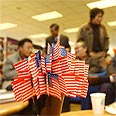
Power to sway voters
Photo: AP
In 1959, a 42-year-old Catholic Democratic Candidate called John Kennedy launched his campaign for the US presidency, seemingly against all odds. Never before has such a young president been elected, never before was a catholic elected, and in the 20th century there was no candidate at the time who was elected without boasting previous experience as a governor or as a senior military commander.
Moreover, the Democratic Party’s top figures did not support Kennedy, as they viewed him as a rookie politician who did not excel as a senator. The public viewed him as a weak-minded playboy who acquired his Senate seat on account of his billionaire father. In response, Kennedy enlisted the help of a group of marketing professionals, who advised him to circumvent the party apparatus and turn to the people through television.
Today, about 50 years later, US candidates continue to invest about 60 percent of their budget in televised public relations efforts. The world’s largest videocracy is underway again.
Researchers are divided on the question of whether this method, which deals with images more than it deals with substance, leads to the election of the best presidents. Some historians today view Kennedy, who was elected on the basis of his televised image, as a hasty president who led the US to the brink of a nuclear war during the Cuban Missile Crisis.
The era of “television presidents” has led to the collapse of well-known and highly qualified candidates who were unable to make it on screen. Lyndon Johnson was forced to abandon the 1968 presidential race because according to some researchers he failed to shape a televised image within the political theater. Walter Mondale, the Democratic presidential candidate in 1984 was characterized by the Washington post as a victim of the camera, which portrayed him as weak and ridiculous.
Bush’s charisma
According to Newsweek, Michael Dukakis, the 1988 Democratic candidate, lost because he was unable to shake off his “iceman” image. On the other hand, actor Ronald Reagan was elected as president, and NBC’s Lesley Stahl later summarized his first term in office by characterizing him as a tired president, and noting that there is a great gap between his energetic TV appearances and reality.The highlight, according to some commentators, was the victory of George W. Bush, who thanks to his charisma on television managed to overcome a serious candidate in the form of Al Gore. According to current polls, Americans are convinced that Bush is one of the worst presidents in US history.
What does this say about today’s candidates? Will the candidate who would make the best president win, or will it be the candidate able to come up with the best TV gimmicks? It is hard to tell.
According to research, 90 percent of US voters get their political information from television. And television, as we know, does not focus on the candidates’ ideas, but rather, on their personality, with the objective being to create a psychological profile rather than an ideological image.















